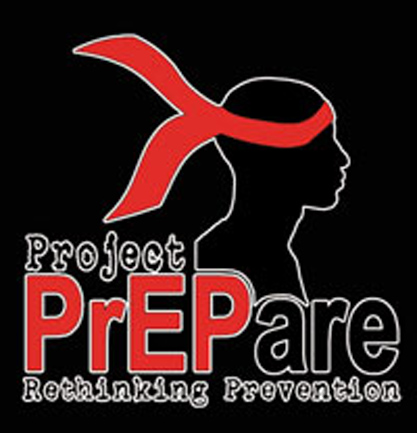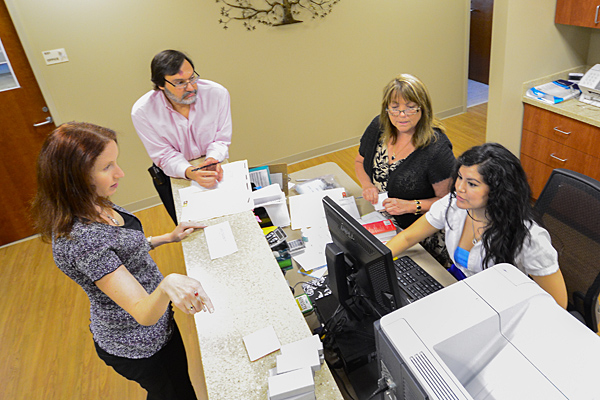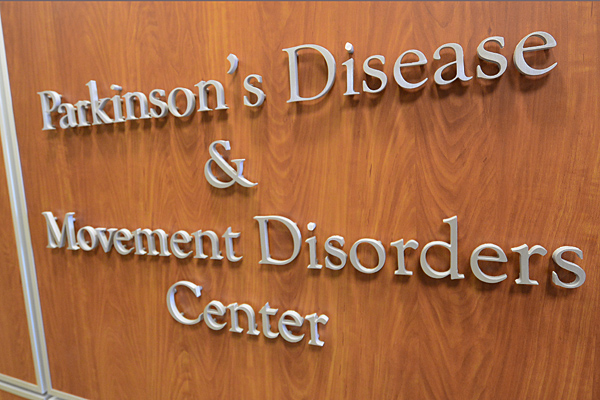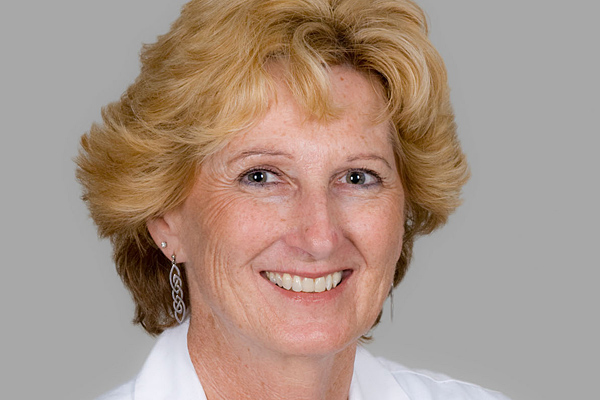This year, more USF Health physicians than ever are transforming the health care of residents throughout the Tampa Bay area, as the 2012 Best Doctors in America® list clearly shows.
Thirty-six percent of the local physicians who made the latest Best Doctors in America® list work at USF Health.
![HeadlineImage]()
Add to that the volunteer and affiliate faculty (those who teach medical students and residents several times each year) and the Morsani College of Medicine alumni in private practice locally, and the percent skyrockets to 69 percent, more than two-thirds of the of entire local list.
The annual list for Best Doctors in America is compiled from surveys of physicians asking them who they would go to for treatment in their specialty. The result is a national listing of 45,000 physicians in more than 40 specialties.
Locally, the USF totals went up in all three areas: on-staff faculty, volunteer faculty, and alumni (MD degree program, as well as graduates from USF resident physician and fellowship programs).
This year, the list included 594 physicians from the Tampa Bay area. Of that, 212 are full-time, courtesy, or adjunct physicians for USF. The list also included 102 physicians who are volunteer and affiliate faculty members for USF, and 132 alumni of the USF Morsani College of Medicine (many alumni are also faculty – those numbers are not double counted in the overall total), bringing the total to 407 physicians (69 percent) who have a connection with USF Health.
“Clearly, USF is a force in local health care,” said Stephen K. Klasko, MD, MBA, dean of the USF College of Medicine and CEO of USF Health.
“As USF Health transforms health care in this region, it’s because of the quality of our faculty and our alumni. These totals say a lot about the caliber of expertise found at USF Health, this region’s only academic medical center. The totals also show how so many of the USF’s medical alumni are still in the local area, reconfirming the fact that physicians tend to remain in the areas where they are trained.”
The following is a list of physicians included in the 2012 Best Doctors in America® who have a connection to USF Health. Some physicians earned spots in more than one specialty, so are listed multiple times.
Allergy and Immunology
Morna Jean Dorsey
Roger Williams Fox
Mark Christian Glaum
Alan Barton Halsey
Craig Andrew Kalik
Dennis K. Ledford
Richard F. Lockey
Daniel A. Reichmuth
Mitchel Seleznick
Mandel Reid Sher
Anesthesiology
Alan David Almengual
Benjamin Contreras
Sarat B. Lingam
Devanand Mangar
Rafael Miguel
Jacinto Moya
Emery Navori
David Jeffrey Samuels
Brooke Williams
Cardiovascular Disease
Fadi A. Matar
Debbie Rinde-Hoffman
Dany Edward Sayad
John Thompson Sullebarger
Colon and Rectal Surgery
Jorge E. Marcet
Critical Care Medicine
W. McDowell Anderson
Attila Becsey
Jonathan B. Cohen
Theron Arthur Ebel
Allan L. Goldman
Albert S.M. Kabemba
Marian Menezes
Ralph E. Robertson
Mark Rumbak
Daniel Jacob Schwartz
John (Hans) Schweiger
David Allan Solomon
Frank W. Walsh
Dermatology
Teresa Pullara Brandt
Basil S. Cherpelis
James B. Connors
Peter A. Donelan
Lowella E. Esperanza
Neil Alan Fenske
John Robert Hamill, Jr.
Timothy Francis Kelly
Kathleen Leber
Nancy Ling
Christopher G. Nelson
Stacy Perez
Philip D. Shenefelt
Family Medicine
Colin S. Beach
Harrison James Brownlee, Jr.
Adam A. Brunson
Sean T. Bryan
Eric Emmanuel Coris
Thomas E. Esposito
Eduardo C. Gonzalez
Richard J. Ina
Paul Lewis
Candice C. Linton
Dolores K. Lowe
John V. Murray, Jr.
Michele D. Pescasio
Joel S. Prawer
Cheryl Reed
Richard G. Roetzheim
Robert B. Rosequist
Joseph P. Springle
Frank Allan Thompson
Ronald Vicencio
Laurie J. Woodard
Kira Katherine Zwygart
Gastroenterology
Patrick G. Brady
Joseph S. Caradonna
Jay J. Mamel
Haim Pinkas
Joel E. Richter
Geriatric Medicine
Claudia Beghé-Balducci
June Y. Leland
Hae Kyoung Park
Geriatric Medicine/Hospice and Palliative Medicine
Jonathan Taylor Stewart
Hand Surgery
Robert John Belsole
John M. Rayhack
Jeffrey D. Stone
Infectious Disease
Lindell A. Busciglio
Margarita Rosa Cancio
Beata C. Casanas
Sandra Gompf
John N. Greene
Douglas Allen Holt
Cynthia Mayer
Jose Montero
Richard Oehler
Jose R. Prieto
John Thomas Sinnott
Charurut Somboonwit
John Toney
Todd S. Wills
Internal Medicine
Erika Abel
Bryan Bognar
Kent R. Corral
Mark Allen Davis
Angela L. Denietolis
Denise K. Edwards
Geoffrey S. Greene
Kathleen Moss Grizzard
Carol A. Hodges
Jeffrey A. Kooper
Hugo J. Narvarte
Kevin O’Brien
Lucila Ramiro
Mayra Rivera
Elizabeth A. Warner
David Weiland
Susan M. Zimmer
Internal Medicine/Hospital Medicine
Michael T. Flannery
Deborah A. Humphrey
Jose (Joe) L. Lezama, Jr.
Cuc Thi Mai
Alexander Reiss
Medical Oncology and Hematology
Khaldoun Almhanna
Melissa Alsina
Claudio Anasetti
Lodovico Balducci
William S. Dalton
Ronald C. DeConti
Martine Extermann
Hugo F. Fernandez
Hyo (Heather) S. Han
Eric B. Haura
Julie A. Kish
Larry K. Kvols
Alan F. List
Susan Minton
Javier Pinilla-Ibarz
Lubomir Sokol
Daniel M. Sullivan
Jeffrey S. Weber
Kenneth S. Zuckerman
Nephrology
Denise Y. Alveranga
Neurological Surgery
Siviero Agazzi
Thomas B. Freeman
Mark Greenberg
Donald A. Smith
Fernando L. Vale
Harry R. Van Loveren
Neurology
Selim Ramin Benbadis
Steven R. Cohen
Robert A. Hauser
Juan R. Sanchez-Ramos
Stephen M. Sergay
Paul R. Winters
Nuclear Medicine
Dwight Achong
Claudia G. Berman
Obstetrics and Gynecology
Jeffrey L. Angel
Ignacio Armas
Madelyn Butler
Sheila Connery
Steven D. Gitomer
Steven L. Greenberg
Mitchel S. Hoffman
Suzanne T. Icely
Michael W. Jaeger
Galen Bruce Jones
Mary Lee Josey
Patricia L. Judson
Craig S. Kalter
Kathleen Kilbride
Johnathan Lancaster
Judette Marie Louis
Catherine M. Lynch
James C. Mayer
Joan McCarthy
Valerie C. Mechanik
Anthony M. Messina
Anna Kristina Parsons
Michael Thomas Parsons
Shayne M. Plosker
Bruce D. Shephard
Barry Stephen Verkauf
James C. Von Thron
W. Gregory Wilkerson
J. Kell Williams
Jerome (Jerry) Yankowitz
Ophthalmology
Craig Berger
Leonard Edward Cortelli, Jr.
Mitchell D. Drucker
Lewis Groden
Scott E. Pautler
Peter Reed Pavan
Thomas J. Pusateri
David W. Richards
Charles B. Slonim
Ivan J. Suner
Orthopaedic Surgery
Richard V. Abdo
Thomas L. Bernasek
Brett R. Bolhofner
William G. Carson, Jr.
Antonio E. Castellvi
Mark A. Frankle
Seth I. Gasser
Thomas L. Greene
Kenneth A. Gustke
Dolfi Herscovici, Jr.
Anthony F. Infante, Jr.
George Douglas Letson
Mark A. Mighell
Heidi Multhopp Stephens
Glenn R. Rechtine II
Henry Claude Sagi
Roy W. Sanders
Michael J. Shereff
Arthur K. Walling
Marc A. Weinstein
Otolaryngology
Loren J. Bartels
Kestutis Paul Boyev
Christopher J. Danner
James N. Endicott
Joseph B. Farrior III
Douglas W. Klotch
Judith Czaja McCaffrey
Thomas Vincent McCaffrey
Tapan Ashvin Padhya
Mark Tabor
Daniel Vincent
Pathology
L. Frank Glass
Jane Messina
Michael Morgan*
Santo V. Nicosia
Pediatric Allergy and Immunology
Alan Barton Halsey
Craig Andrew Kalik
Mandel Reid Sher
John W. Sleasman
Pediatric Anesthesiology
George Garcia Alvarez
Glenn C. Vaughn
Pediatric Cardiology
Alfred Asante-Korang
Michael L. Epstein
Jorge Manuel Giroud
James Gifford Henry
Richard Manuel Martinez
Jorge McCormack
Pediatric Critical Care
David Seth Cooper
Perry Boyd Everett
John C. Haffner
David Pettigrew
Daniel J. Plasencia
Dan Riggs
Albert Saltiel
Richard E. Weibley
Pediatric Developmental and Behavioral Problems
Carol Lilly
Pediatric Endocrinology
Terry J. DeClue
E. Verena Jorgensen
Henry Rodriguez
Dorothy I. Shulman
Pediatric Gastroenterology
Daniel T. McClenathan
Michele P. Winesett
Pediatric Hematology-Oncology
Jerry L. Barbosa
Gregory A. Hale
Michael L. Nieder
Pediatric Infectious Disease
David Michael Berman
Juan Dumois
Jorge Lujan-Zilbermann
Pediatric Nephrology
Alfonso Campos
Valerie M. Panzarino
Sharon A. Perlman
Pediatric Neurological Surgery
Sarah J. Gaskill
Arthur E. Marlin
Pediatric Ophthalmology
Derek B. Hess
Pediatric Orthopaedic Surgery
Scott Warren Beck
Alfred V. Hess
Jeffrey B. Neustadt
Pediatric Otolaryngology
Thomas M. Andrews
Wade Russell Cressman
Karin S. Hotchkiss
Peter W. Orobello, Jr.
Pediatric Plastic Surgery
Ernesto Ruas
Pediatric Pulmonology
Tony Kriseman
Pediatric Rheumatology
Mandel Reid Sher
John W. Sleasman
Pediatric Specialist/Child and Adolescent Psychiatry
Jeffrey L. Alvaro
Michael Bengtson
Glenn Catalano
Mark A. Cavitt
Steven Noah Kanfer
Tanya K. Murphy
Kailie R. Shaw
Saundra Stock
Pediatric Specialist/Neonatal-Perinatal Medicine
Anthony E. Napolitano, Jr.
Lewis P. Rubin
Roberto A. Sosa
Pediatric Specialist/Neurology, General
Maria A. Gieron-Korthals
J. Richard Gunderman
Steven Parrish Winesett
Pediatric Surgery
Charles Paidas
Pediatric Urology
Yves L. Homsy
E. Michael Reisman
Pediatrics/General
Melody M. Baade
Lori A. Bowers
Christina J. Canody
Jose E. Colon
Sharon M. Dabrow
Gabriele Hosemann
Gerard R. Hough
Patricia L. Jeansonne
Karalee Kulek-Luzey
Mudra K. Kumar
Katherine Lewis
Carol Lilly
Fred I. Lipschutz
Hugo J. Narvarte
Pamela M. Patranella
Emily T. Perkins
Lorinda J. Price
Domenick P. Reina
Christopher D. Reiner
Jennifer Cohen Takagishi
Ignatius I. Tan
Christopher L. Tappan
Margarita P. Torres
Pediatrics/Hospital Medicine
Dipti Patel Amin
Antoinette C. Spoto-Cannons
Plastic Surgery
Edward H. Farrior
Ernesto Ruas
Karen E. Wells
Psychiatry
Jeffrey L. Alvaro
Glenn Catalano
Maria C. Catalano
Mark A. Cavitt
Francisco Fernandez
Laura Grimsich
Jaffrey Hashimie
Steven Noah Kanfer
Patrick Marsh
Tanya K. Murphy
Pauline S. Powers
Sarah Reading
Deborah C. Roth
Orlando Ruano
Deborah Sanchez
Amanda Grant Smith
Jonathan Taylor Stewart
Pulmonary Medicine
W. Michael Alberts
W. McDowell Anderson
Allan L. Goldman
Daniel Lorch
Marian Menezes
Richard S. Powell
Mark Rumbak
Daniel Jacob Schwartz
David Allan Solomon
Frank W. Walsh
Radiation Oncology
Harvey M. Greenberg
Sarah Hoffe
James L. Pearlman
Andrea (Andy) Trotti III
Radiology
John A. Arrington
Gregg A. Baran
Junsung Choi
Lynn Coppage
Robert (Bob) Jay Entel
Carlos R. Martinez
Frederick Reed Murtagh
Bruce R. Zwiebel
Rheumatology
John D. Carter
Laura Cruse
Dennis K. Ledford
Anthony Sebba
Mitchel Seleznick
Kimberly M. Smith
Joanne Valeriano-Marcet
Sleep Medicine
W. McDowell Anderson*
Daniel Lorch
Richard S. Powell
Daniel Jacob Schwartz
Surgery
Michael H. Albrink
Angel E. Alsina
Sylvia Deal Campbell
Charles E. Cox
Steven B. Goldin
James M. Hurst
Richard Clemens Karl
Christine Laronga
John Leone
Michel Murr
Ernest C. Rehnke
Terry E. Wright
Surgical Oncology
W. Bradford Carter
Charles E. Cox
C. Wayne Cruse
Richard Clemens Karl
Mokenge P. Malafa
Douglas S. Reintgen
David Shibata
Vernon K. Sondak
Jonathan Scott Zager
Thoracic Surgery
Keith Eric Sommers
Urology
Rafael Carrion
Mohamed A. Helal
Jorge L. Lockhart
Frank D. Mastandrea
Julio M. Pow-Sang
Vascular Surgery
Martin R. Back
John L. Driscoll
Brad Larvin Johnson
John Leone
Ernest C. Rehnke
Murray L. Shames
































































